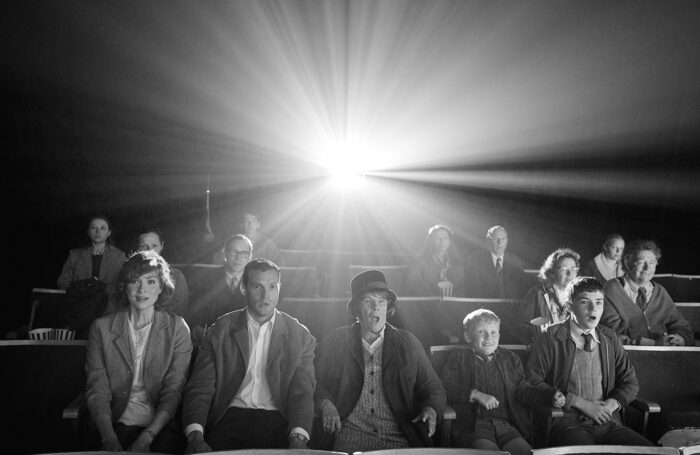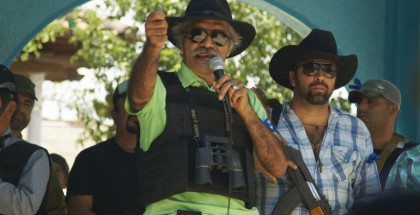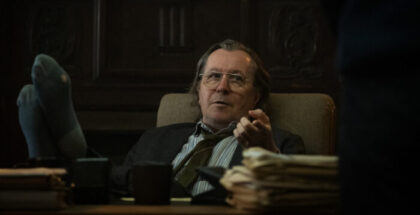VOD film review: Belfast
Review Overview
Subtlety
7Scale
8Sentiment
9David Farnor | On 21, Feb 2022
Director: Kenneth Branagh
Cast: Jude Hill, Lewis McAskie, Caitriona Balfe, Jamie Dornan, Judi Dench, Ciarán Hinds
Certificate: 12
“There is no our side and their side in our street. Or there didn’t used to be.” That’s Pa (Jamie Dornan) to Buddy (Jude Hill) in Belfast, Kenneth Branagh’s love letter to the titular city. The film follows the family as they try to navigate life on the brink of the Troubles in Northern Ireland – older brother Will (Lewis McAskie), Ma (Caitriona Balfe), and Pa’s parents, Granny (an enjoyably sharp-tongued Judi Dench) and Pop (a superbly wistful Ciarán Hinds).
Unfolding in black-and-white, it recalls Alfonso Cuaron’s similarly personal cinematic autobiography, Roma, but on a much smaller scale. That, however, isn’t a flaw – where Cuaron’s astonishing masterpiece is a moving, often heart-wrenching epic, Branagh’s nostalgic memoir is a knowingly twee slice of sentiment and memory. The backdrop recalls, at times, Yann Demange’s nail-biting historical thriller 1971, but this isn’t a film about the Troubles in that sense – this is a film about the normality that was disrupted by it.
Buddy, on the cusp of adolescence, can’t possibly grasp the tensions brewing beneath the cheerful surface of his innocent existence. His main concern in life is getting a good enough score at school to be able to move up a desk to sit next his classroom crush. Jude Hill is endearing as the wide-eyed kid, and it’s his open-mouthed wonder at going to see Chitty Chitty Bang Bang in the cinema that fuels Branagh’s decision to film everything in monochrome, except for the colourful flashes of escapism that movies and theatre provide. The director’s typically Dutch camera angles also keep us firmly at Buddy’s eye level, tilting up at the adults around him, or looking down on him with the aerial perspective of a grown-up recalling his childhood.
But while Buddy is ostensibly our hero, the film’s strength lies in the way that it captures the challenges facing his parents. Jamie Dornan delivers a career-best turn as the stern but soft-centred Pa, who stands up to the threats of Ulster loyalist Billy (Colin Morgan) yet doesn’t hesitate to belt out Everlasting Love to his wife at the local dancehall. A builder by trade, he’s away in England for most of the week, which leaves the family unprotected amid the gradually escalating conflict, but his trips abroad spark the dilemma that he and Ma must face: do they stick where they are and hope things will resolve, or start a safer life overseas at the cost of leaving everything they call home?
The family are Protestants and live peacefully with their Catholic neighbours in a Protestant-majority area, and there’s a Western-like intensity to the lone man refusing to take a side at a time when being impartial is seen as doing just that – Dornan has a romantic swagger that towers over the cobbled pavements. But his family man would be nothing without Ma by his side, and Caitriona Balfe is wonderfully steely as the resilient matriarch, whose response to Buddy getting caught up in a gang looting a supermarket is to march him through the unfolding riot to take back the box of detergent he stole – a moment that might sound implausible but rings with the truth of a frazzled parent frantically trying to find a way to do the right thing in an impossible situation.
At the helm, Branagh wears his emotions on his sleeve, but that earnest approach makes for an overwhelming, moving journey through small streets that feel increasingly like a tiny bubble away from the real life situation about to burst into everyday lives. As Ma and Pa contemplate whether to stay or go, the film’s end title cards make it clear that this an ode to anyone who had to find a way through the years that followed, regardless of their decision – a beautifully tender piece of remembrance that unabashedly sheds a tear. Don’t be surprised if you join in.



















